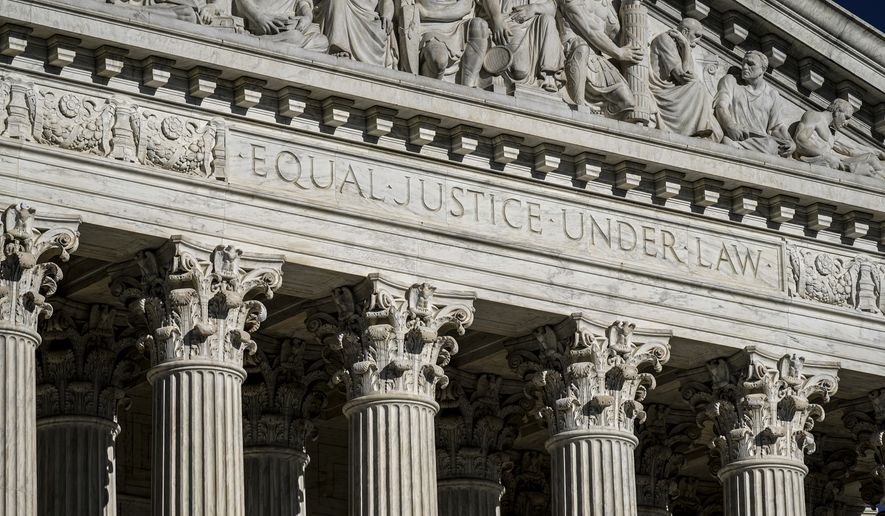The Supreme Court heard arguments Tuesday over a Kentucky abortion law that pro-choice advocates said could open the door to states increasingly implementing restrictions for women if the justices side with the state’s Republican attorney general.
The court won’t weigh in on the legality of the state law, which restricted a type of abortion procedure involving the dismemberment of a fetus inside the womb.
Instead, the justices will decide if Kentucky Attorney General Daniel Cameron has a legal right to defend the legislation since two lower courts struck it down as unconstitutional after Kentucky’s Health and Family Services secretary declined to further appeal the case.
“What we want as Kentuckians is a fail-safe,” said Matthew Kuhn, who represented Mr. Cameron and Kentucky. “We are here as the agent of Kentucky… a state has the power to act only through its agent.”
Mr. Kuhn argued that the state’s attorney general, Mr. Cameron, should have the ability to jump in and replace the Health secretary in defense of the abortion law.
The case arose when Kentucky passed legislation, known as House Bill 454, in 2018 regulating D&E abortions, known as dilation and evacuation where the fetus is torn apart — or dismembered — in the womb.
The state law did not completely ban D&E abortions, but the legislation said the fetus must not be alive when dismembered and also the procedure could not be performed after 13 weeks of pregnancy.
EMW Women’s Clinic and abortion providers sued to challenge the law as unconstitutional.
Lower courts sided with the providers, striking down the restriction.
The state’s Health secretary declined to further appeal the case, but Mr. Cameron moved to intervene to defend the state’s interest in implementing the restrictions on D&E abortions.
EMW opposed that move, and again the U.S. Circuit Court of Appeals for the Sixth Circuit sided with the abortion providers, prompting Mr. Cameron to take the case to the high court.
A few of the justices, though, questioned what basis Mr. Cameron would have in jumping into the litigation at this late stage.
“You didn’t appeal on time,” said Justice Sonia Sotomayor, an Obama appointee. “Under what theory of law would we be able to say the Sixth Circuit abused its discretion?”
Justice Clarence Thomas, a Bush appointee, likewise asked what precedent Mr. Cameron had to support his position.
Alexa Kolbi-Molinas, an attorney with the American Civil Liberties Union representing EMW Women’s Clinic, said Mr. Cameron failed to reserve any interest in the case because he did not file a notice of appeal within the 30-day requirement.
“If you fail to appeal, you are out,” said Ms. Kolbi-Molinas.
In a press release published after the hearing, Ms. Kolbi-Molinas said, “Enough is enough.”
“Two courts already held that this law violates the rights of Kentuckians. The Supreme Court ought to put an end to the attorney general’s attempts to force people to continue their pregnancies against their will. Politicians across the country are using every tool in the shed to push abortion further and further out of reach,” she said.
The justices are expected to rule on the matter by the end of June.
Mr. Cameron told reporters after the case was argued before the justices that this legal battle centers on his office’s ability to defend Kentuckians’ rights.
“We don’t want that baby to feel pain,” Mr. Cameron said. “I’m hopeful and optimistic that we will have the ability to continue to defend House Bill 454.”
Abortion has become a top issue in recent months percolating in courts throughout the country.
Though the Kentucky case hinges on the attorney general’s ability to defend a state law, the justices are set to review a Mississippi case in December that directly challenges Roe v. Wade, the court’s 1973 precedent that granted women a right to an abortion up until a fetus is viable, which was between 24 to 28 weeks.
Mississippi passed a ban on abortion after 15-weeks of pregnancy, arguing Roe is outdated.
Other conservative states, like Texas, have also moved to pass increasingly strict laws.
Texas recently passed a law banning abortion after a fetal heartbeat is detected, which can occur as early as six weeks of pregnancy. But the Texas law is unique in that it allows private citizens to sue abortion providers who violate the legislation — it does not give state officials the power to patrol or criminalize violators.
Abortion providers and the Department of Justice have challenged the state’s fetal heartbeat law in court and those cases are pending before the U.S. Circuit Court of Appeals for the Fifth Circuit.
• Alex Swoyer can be reached at aswoyer@washingtontimes.com.




Please read our comment policy before commenting.